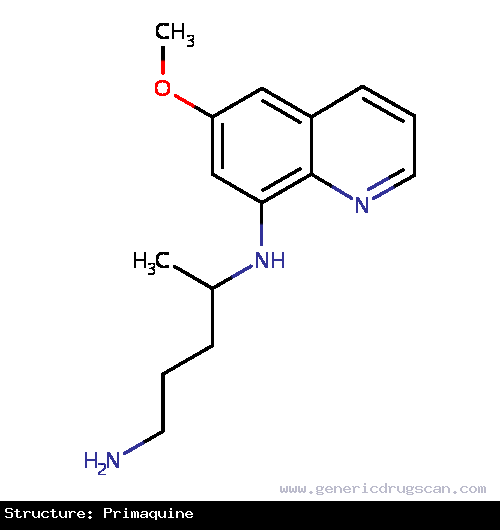Primaquine Drug: Indication, Dosage, Precaution, Side Effect , Storage, Category Type and corresponding Brands - www.genericdrugscan.com
Primaquine
Drug Status in USA : ApprovedDrug Status in Canada : Approved
pronunciation
pronounced as (prim' a kwin)
Why is this medication prescribed?
Primaquine is used alone or with another medication to treat malaria (a serious infection that is spread by mosquitoes in certain parts of the world and can cause death) and to prevent the disease from coming back in people that are infected with malaria. Primaquine is in a class of medications called antimalarials. It works by killing the organisms that cause malaria.
How should this medicine be used?
Primaquine comes as a tablet to take by mouth. It is usually taken once a day for 14 days. Take primaquine at around the same time every day. Follow the directions on your prescription label carefully, and ask your doctor or pharmacist to explain any part you do not understand. Take primaquine exactly as directed. Do not take more or less of it or take it more often or for a longer period of time than prescribed by your doctor.
Take primaquine until you finish the prescription, even if you feel better. If you stop taking primaquine too soon or skip doses, your infection may not be completely treated.
What are the precautions to be followed?
Before taking primaquine,- tell your doctor and pharmacist if you are allergic to primaquine, any other medications, or any of the ingredients in primaquine tablets. Ask your pharmacist for a list of the ingredients.
- tell your doctor if you are taking penicillin; cephalosporins such as cephalexin (Keflex), cefaclor, cefuroxime (Ceftin), cefdinir (Omnicef), or cefpodoxime (Vantin); levodopa (in Sinemet); medications to treat cancer;methyldopa (Aldomet); or quinidine. Your doctor will probably tell you not to take primaquine. Also do not take primaquine if you are taking or have recently taken quinacrine (not available in the US).
- tell your doctor and pharmacist what other prescription and nonprescription medications, vitamins, nutritional supplements, and herbal products you are taking or plan to take.
- tell your doctor if you have or have ever had rheumatoid arthritis, hemolytic anemia (a condition with an abnormally low number of red blood cells), lupus erythematosus (a disease that occurs when the body's tissues are attacked by antibodies from its own immune system), methemoglobinemia (a condition with defective red blood cells that are unable to carry oxygen to the tissues in the body),nicotinamide adenine dinucleotide (NADH) deficiency (a genetic condition), glucose-6-phosphate dehydrogenase (G6PD) deficiency (a genetic condition), or if you or someone in your family has had a reaction after eating fava beans.
- tell your doctor if you are pregnant, plan to become pregnant, or are breast-feeding. If you become pregnant while taking primaquine, call your doctor.
What are possible side effects of this medication ?
Primaquine may cause side effects. Tell your doctor if any of these symptoms are severe or do not go away:- nausea
- vomiting
- heartburn
- abdominal cramps
- tiredness
- pale skin
- shortness of breath
- fast heartbeat
- yellowing of the skin or eyes
- dark colored urine
- headache
- lack of energy
- grey-bluish color of lips and/or skin
- nervousness
- seizure
- weak pulse
- confusion
- sore throat, fever, cough, or other signs of infection
- fainting
- dizziness
- blurred vision
Primaquine may cause other side effects. Call your doctor if you have any unusual problems while taking this medication.
How to store the medication and dispose it of after its use later?
Keep this medication in the container it came in, tightly closed, and out of reach of children. Store it at room temperature and away from excess heat and moisture (not in the bathroom). Throw away any medication that is outdated or no longer needed. Talk to your pharmacist about the proper disposal of your medication.
Drug Category/Class
- Aminoquinolines
- Antimalarials
- Antiparasitic Products, Insecticides and Repellents
- Antiprotozoal Agents
- Cytochrome P-450 CYP1A2 Inhibitors
- Cytochrome P-450 CYP1A2 Inducers
- CYP2D6 Inducers
- CYP2D6 Inducers (strong)
- CYP3A4 Inhibitors
- Aminoquinolines
| Prescribed | For the treatment of malaria. |
| Weight : | 259.3467 |
| Structure | Primaquine |
 | |
| Formula | C15H21N3O |
Primaquine has 25 Brands listed
Search Generic Drugs alphabetically
